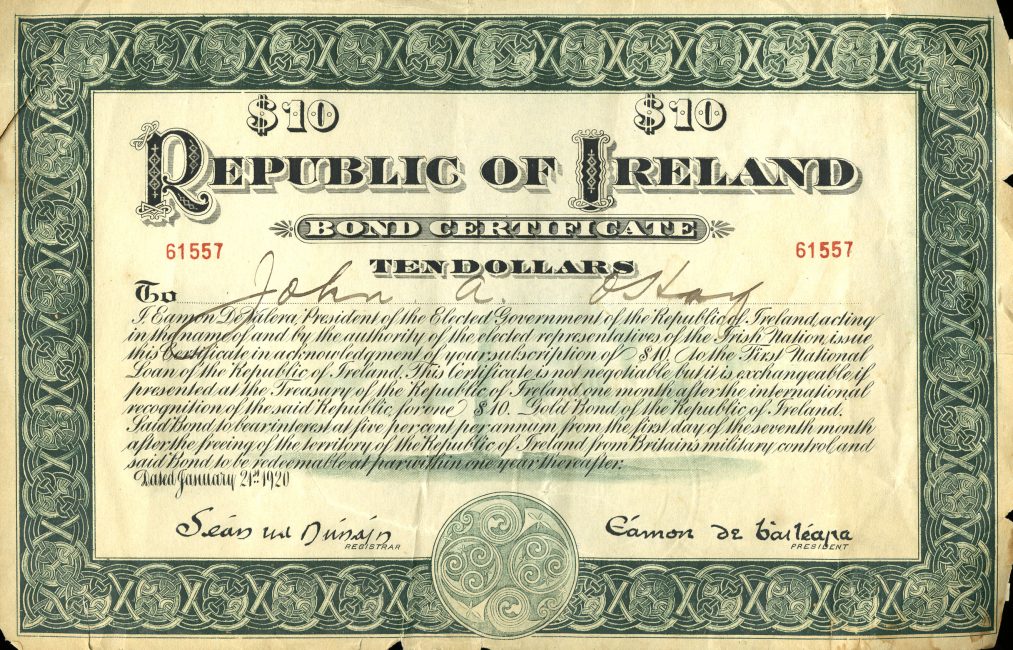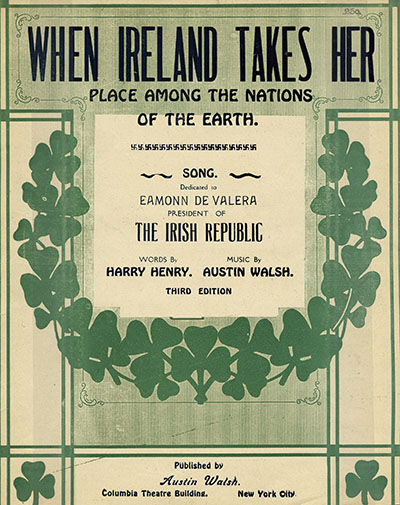Eamon de Valera (1882-1975) dominated Irish politics during the first half of the twentieth century: an active member of the Gaelic League, he joined the Irish Volunteers in 1913 and played a significant role in the Easter Rising. He was in command at Boland’s Bakery, for which he was originally sentenced to death. His sentence was commuted because of his American citizenship. The most senior officer to survive the Rising, de Valera was elected to lead Sinn Féin in 1918 and President of the first Dáil. He toured the United States in 1919 to raise money and to try to legitimize the Republic. De Valera rejected the 1921 Anglo-Irish Treaty and resigned as president of the Dáil after its ratification. He led the Anti-Treaty side during the Civil War. With Constance Markievicz, Sean Lemass, and others, de Valera founded Fianna Fáil in 1926. Fianna Fáil became part of the Dáil in 1927 and won elections in 1932. De Valera oversaw a new constitution in 1937, which strongly asserted Ireland’s sovereignty. He served several terms as Taoiseach (Head of the Irish Government, appointed by the President) between 1937 and 1959. De Valera was elected President of Ireland in 1959 and was re-elected in 1966.
American Commission on Irish Independence. Republic of Ireland bond certificate, 1920.
On loan from Professor Jim Burns
Once armistice was declared after World War I, Irish-American advocates in the United States began appealing to President Woodrow Wilson to influence British government representatives on behalf of Irish independence. Previous associations with Germany before 1917 had put many Irish-Americans nationalists under suspicion, and they worked to emphasize Irish nationalism. Clan na Gael and the Irish Progressive League organized the Irish Race Convention in Philadelphia in 1919 to express support for Irish self-government. The officers of the Irish Race convention appointed a sub-committee called the American Commission on Irish Independence, led by labor lawyer Frank P. Walsh. The Commission’s main task was to bring Eamon de Valera, Arthur Griffith, George Plunkett (father of Joseph Mary Plunkett) and the question of Irish independence to the Paris Peace Conference in 1919.
De Valera asked the American Commission to launch and manage the bond campaign for the first Dáil loan.
“My great-grandfather, John O’Hay, purchased one of these bonds. He had two daughters, one of whom, Brigit, later married my grandfather, James H. Burns. James Burns fought in the Rising at Four Courts as a member of G Company, First Battalion, Dublin Brigade, of the Irish Volunteers. It was my grandmother who told me stories when I was young of our family’s connection to the revolution in Ireland. I never knew my grandfather; he died when my father was a young man. My grandmother told us that he had been beaten by scabs during a strike at the brewery where he worked. The bond and other documents were found in my grandmother’s apartment in Newark, New Jersey, after her death.” –Jim Burns
Henry, Harry. When Ireland takes her place among the nations of the earth. Dedicated to Eamon de Valera, President of the Irish Republic. New York, New York: Published by Austin Walsh/Columbia Theatre Building, 1919.
Sheet music.
De Valera toured the United States during 1919 to (unsuccessfully) seek recognition for the Republic of Ireland; he did, however, raise several million dollars in funds from supportive Irish-American associations and individuals.
Note the use of the swastika toward the top of the page. In the early twentieth century, the swastika was an internationally recognized symbol of good luck and success. Its use here suggests hope for Ireland’s victory in the War of Independence.
The forward to this history of the first thirty-five years of Fianna Fáil was written by Seán Lemass, one of its founders and Taoiseach from 1959 until his retirement in 1966. Lemass was a veteran of the Easter Rising, the War of Independence, and the Civil War. Lemass worked to bring economic prosperity to Ireland and foster international relations with Europe.




